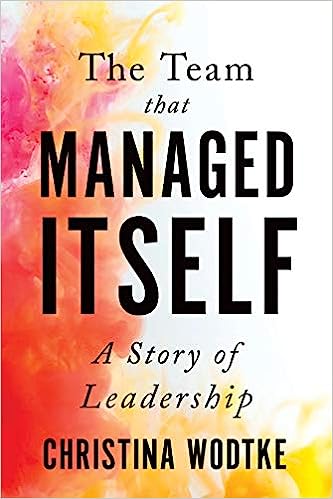
The Team that Managed Itself: A Story of Leadership (Empowerd Teams) - Christina Wodtke
Date read: 2020-11-25How strongly I recommend it: 5/10
(See my list of 150+ books, for more.)
Go to the Amazon page for details and reviews.
Written in the format of a business fable followed by techniques and lessons learn, there wasn't anything new here and in some cases, I disagreed with the approach. It's very focused on how to manage from a start-up perspective but there are many other books and methods I would recommend before the ones listed here.
My Notes
“First, you have to change your thinking. There are no bad employees. There are employees who don’t know things yet. And there are employees who resist change, but don’t know that they are losing power and influence because of their behavior. They conflate behavior with identity. And there are employees who are a bad fit. This last one is very difficult.”
“Teams have four elements—common commitment and purpose, performance goals, complementary skills, and mutual accountability.”
You want a smart group of people all teaching each other their superpowers.
You’ve heard that you must break a leg again if it’s set wrong. It’s the same situation when a team has settled into bad (or even so-so) patterns. A great team must step back into conflict again and again to break the substandard status quo and find the best way to execute.
An Objective is like a mission statement, only for a shorter period of time. A great Objective inspires the team, is hard (but not impossible) to do in a set time frame, and can be done by the person or people who have set it, independently.
Here are some good Objectives: Pwn the direct-to-business coffee retail market in the South Bay. Launch an awesome MVP. Transform Palo Alto’s coupon-using habits. Close a round that lets us kill it next quarter.
Key Results take all that inspirational language and quantify it. You create them by asking a simple question, “How would we know if we met our Objective?”
Typically you have three Key Results. Key Results can be based on anything you can measure, including: Growth Engagement Revenue Performance Quality.
OKRs are always stretch goals. A great way to do this is to set a confidence level of five out of ten on the OKR. By confidence level of five out of ten, I mean, “I have confidence I have only a fifty-fifty shot of making this goal.”
Do not change OKRs halfway through the quarter. If you see you’ve set them badly, suck it up, and either fail or nail them, and use that learning to set them better next time.
Studies show women will not apply for a job unless they are 100 percent qualified, while men will apply when they are 60 percent qualified. If you only list what you absolutely need in a candidate, you will get a bigger pool of prospects.
They discovered the language of competition was off-putting to women and the language of cooperation was appealing.
Treat norm violations like spelling errors. Everyone makes them sometimes, but you don’t want to make it a regular thing—it’s unprofessional. A person who violates the team’s norms may feel a bit guilty, but they should never feel ashamed.
The job of a manager is to make yourself as unnecessary as possible.
A coach who tells you how to solve your problems is giving you a one-size-fits-all answer, creating dependency if the advice works, and blowing up in your face when it’s wrong. But a coach who pushes you to closely examine your situation and develop your own solutions is a great coach.
From curiosity, change your emotional state to sympathy, then empathy, and finally compassion. Sympathy allows you to see they have a different experience; empathy allows you to feel their struggle as well as your own. Compassion is empathy with an action item. Compassion gives you the right posture to communicate feedback. When you move from wanting to give feedback because you’re hurt to wanting to give feedback to help them be more successful, then you are ready to shape your message.
Less information is more likely to be taken to heart. I’ve found when I give three pieces of feedback, all are acted upon. When I gave twenty, none were. It’s just too overwhelming. Save little things for the one-on-ones, and cover the big issues in the quarterly.
If you rely on OKR results to guide your decisions, you will encourage sandbagging and punish your biggest dreamers. Reward what people do, not how good they are at working the system.
Feedback is anecdata. Sometimes it tells you something about you, sometimes it tells you something about the other person, and sometimes it tells you something about the interpersonal dynamic. Listen thoughtfully and choose strategically what you do with that information.